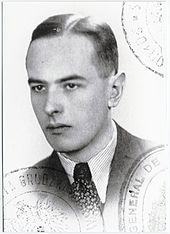

Queer Places:
Cimetière de Vence, 7 Impasse Clos de Laure, 06140 Vence, France
 Witold Marian Gombrowicz (August 4, 1904 – July 24, 1969) was a Polish
writer and playwright. His works are characterised by deep psychological
analysis, a certain sense of paradox and absurd, anti-nationalist flavor. In
1937 he published his first novel, Ferdydurke, which presented many of
his usual themes: the problems of immaturity and youth, the creation of
identity in interactions with others, and an ironic, critical examination of
class roles in Polish society and culture. He gained fame only during the last
years of his life, but is now considered one of the foremost figures of Polish
literature. His diaries were published in 1969 and are, according to the
Paris Review, "widely considered his masterpiece".[1]
Witold Marian Gombrowicz (August 4, 1904 – July 24, 1969) was a Polish
writer and playwright. His works are characterised by deep psychological
analysis, a certain sense of paradox and absurd, anti-nationalist flavor. In
1937 he published his first novel, Ferdydurke, which presented many of
his usual themes: the problems of immaturity and youth, the creation of
identity in interactions with others, and an ironic, critical examination of
class roles in Polish society and culture. He gained fame only during the last
years of his life, but is now considered one of the foremost figures of Polish
literature. His diaries were published in 1969 and are, according to the
Paris Review, "widely considered his masterpiece".[1]
Gombrowicz had affairs with both men and women. In his later serialised Diary (1953–69) he wrote about his adventures in the homosexual underworld of Buenos Aires, particularly his sexual experiences with young men from the lower class, a theme which he picked up again when interviewed by Dominique de Roux in A Kind of Testament (1973).[4]
Having received a scholarship from the Ford Foundation, Gombrowicz returned to Europe in 1963. He stayed for a year in West Berlin, where he endured a slanderous campaign organised by the Polish communist authorities.[5][6] His health deteriorated during this stay, and he was not able to go back to Argentina. He went back to France in 1964. He spent three months in Royaumont abbey, near Paris, where he met Rita Labrosse, a Canadian from Montreal who studied contemporary literature. In 1964 he moved to the Côte d'Azur in the south of France with Labrosse, whom he employed as his secretary. He spent the rest of his life in Vence, near Nice.
Gombrowicz's health prevented him from thoroughly benefiting from this late renown. It worsened notably in spring 1964; he became bedridden and was unable to write. In May 1967 he was awarded the Prix International. The following year, on December 28, he married Rita Labrosse. On the initiative of his friend Dominique de Roux, who hoped to cheer him up, he gave a series of thirteen lectures about the history of philosophy to de Roux and Rita, ironically titled "Guide to Philosophy in Six Hours and Fifteen Minutes", transcribed by de Roux. The lectures started with Kant and ended with existentialism. The series ended before Gombrowicz could deliver the planned last part, interrupted by his death on July 24, 1969.[7][8] He was buried in the cemetery in Vence.
My published books: